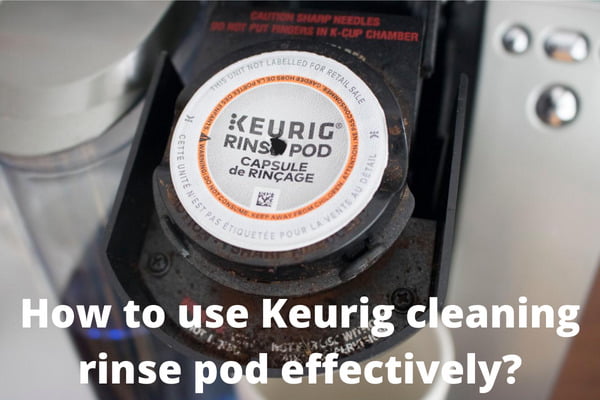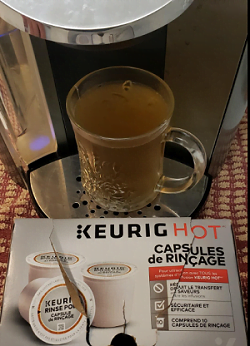Being a coffee lover, I never get tired of experimenting with different coffee pods and drinks, and Keurig helps me with that.
However, I have noticed that when I brew flavored coffee, iced coffee, hot chocolates, or even tea, the taste changes over time. While searching, I found that it is basically due to the mixing of flavors from different pods and the residue left behind.
To facilitate its customer, Keurig includes Keurig rinse pods as parts of their maintenance kits. And I must these tiny pods definitely worth it if you love to brew different beverages in your Keurig

What does Keurig Rinse Pods do?
Keurig Rinse pods look similar to K-Cups and are very effective in cleaning the K-cup holder, the brewer funnel, and exit needles. These cleaning pods are specifically designed to clean away leftover coffee residues and oil.
Its special formula effectively cleans any leftover coffee grinds that are accumulated from previous brews.
Keurig rinse pods are compatible with all Keurig models. Each pack of Keurig rinse pods contains 10 pods, and each pod is meant to be used only once.
How to use Keurig rinse pods?
The instructions for using Keurig Rinse Pods are exactly similar to coffee brewing.
- Fill the water reservoir with clean drinking water.
- Place large cup on drip tray. Open the head of the Keurig machine and insert a Keurig rinse pod inside the K-Cup pod holder.
- Close the lid and select the largest brew size button.
- Once the machine is done, discard the water that is collected in the cup.
- Discard the Keurig Rinse pod from the machine.
- Put back the cup on the drip tray and run a water-only cleaning cycle before brewing coffee.

4 Ingredients of Keurig Rinse pods
As mentioned earlier, the Keurig rinse pod is a non-toxic, safe, and very effective cleaning agent. It consists of 4 main natural ingredients that make it very effective in cleaning.
CRITIC ACID
Citric acid is an effective synthetic cleaning chemical for cleaning corrosion, hard water stains, and calcium buildup from coffee machines.
Citric acid is perfect for cleaning Keurig machines because it doesn’t leave behind a strong taste like other acid-based cleansers.
Sodium citrate
Sodium citrate is a water softening agent used in the Keurig rinse pods. It works to break down and remove mineral deposits and limescale buildup in the K cup holder.
Sodium bicarbonate
Sodium bicarbonate, also known as baking soda, is an effective way to remove grease and dirt buildup from K-cup holders.
Maltodextrin
Maltodextrin is a carbohydrate derived from starch, and it’s used in Keurig rinse pods to help with the dissolution and dispersion of the cleaning agents. It ensures thorough and consistent cleaning of the machine.
These 4 ingredients combo creates a non-toxic, safe and effective cleaning agent that is gentle and odorless and is used globally for its effectiveness.
Read a detailed guide on how to clean a Keurig
Keurig Rinse pods vs descaling solution
Keurig rinse pods and descaling solutions are quite different from each other in terms of purpose, frequency of use, residual smell, and ingredients.
Below is the table that summarizes the difference between the Keurig cleaning pod and the descaling solution.
| Keurig rinse pod | Descaling solution | |
| Area of cleaning | Clean the K-cup holders and the exit needles | Clean and descale the water pathway and internal heating element |
| Frequency of use | Recommended to use it at least once a week | Used for descaling the machine once in 3-6 months |
| Odor | Leave no or little smell that can be removed with a single rinse cycle using only water. | Leaves a strong odor that is removed by doing several water-only cycles. |
| Ingredients | Contain citric acid Sodium citrate, Sodium bicarbonate | Citric acid, Silicic acid Bleaching agents Water |
How often do you use Keurig rinse pods?
You should use Keurig rinse pods once a week to eliminate flavor residue and oil that is building up in your K-cup holder compartment.
However, there is no universal rule that you have to wait for a week to clean up the machine. If you notice a bad taste in your Keurig coffee you should use a rinse pod to prevent such flavor contamination before brewing.
Are Keurig Rinse Pods Necessary?
Keurig Rinse pods are necessary to remove the lingering flavors from old coffee pods.
These Cleaning Pods are especially important if you love to brew different types of beverages (hot chocolates, coffees, teas) to avoid flavor carry-over.
Check out our favorite K cups
FAQs
are Keurig rinse pods toxic?
No, Keurig Rinse pods are not toxic and completely safe to use.
These cleaning pods contain citric acid, Sodium citrate, and Sodium bicarbonate which have no negative effect on health.
Do Rinse Pods Descale the coffee Maker
No Keurig Rinse Pods don’t descale the coffee maker they just clean the pod holder and coffee maker’s outlet.
For thorough cleaning, it is recommended to descale the Keurig once every three months.
Related Keurig Articles
- Can you put hot milk in Keurig? Do and Donts
- How to make strong coffee with Keurig
- How to reuse K cup coffee pods




